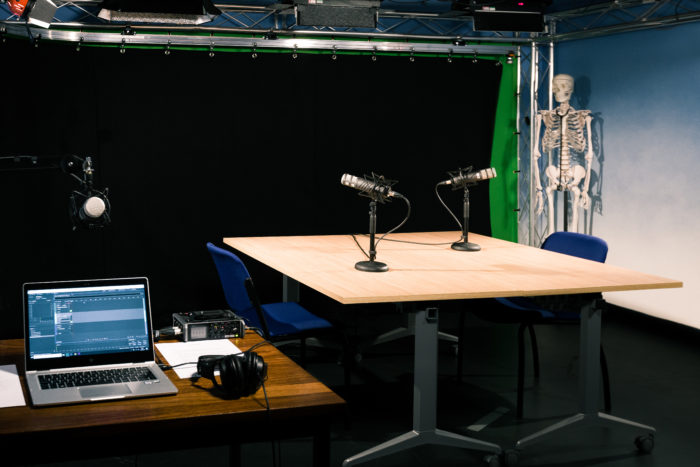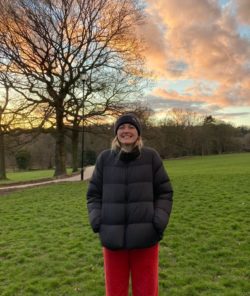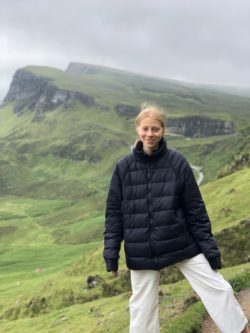Humans of Healthcare
Humans of Healthcare

Humans of Healthcare is a podcast show for University of Leeds students and senior staff in healthcare to talk about the challenges they have encountered and how they have dealt with them. The aim of this is to highlight that all of us can have challenges throughout our life and it is normal. In healthcare there is no need to hide these issues and it is good to talk about them with colleagues, friends and professionals if required. Through this we hope to dispel the myth that students and senior staff in healthcare settings have to be super heroes, and that like everyone else they need to look after their physical and mental health.
About the hosts
Bee Wills
 Bee is a fourth year medical student at the University of Leeds. She is passionate about promoting and furthering equality within the school of medicine and has found great pleasure in being on the EDI (equality, diversity and inclusion) committee for the last couple of years.
Bee is a fourth year medical student at the University of Leeds. She is passionate about promoting and furthering equality within the school of medicine and has found great pleasure in being on the EDI (equality, diversity and inclusion) committee for the last couple of years.
She has enjoyed her work throughout the pandemic and university holidays as a hospital porter. Her main interests outside of medicine include playing football and cycling as well as reading and listening to music (preferably live at a music festival!).
Florence Kinder

Florence is a Junior Doctor in London, having graduated from the University of Leeds in 2022. She began her journey with Humans of Healthcare, recording a podcast reflecting on her time working in A&E during the pandemic. She is passionate about humanitarian work and Inclusion Health and hopes to combine this with her medical career.
She’s also interested in academic medicine and research and has published several papers during her time at Leeds.
In her spare time, she enjoys writing and getting outside and exploring new places! She can frequently be found at a Saturday morning ParkRun!
Nafi Iftekhar

Nafi is an intercalating medical student at Leeds Medical School, currently undertaking a Masters in Medicine (Research). He is interested in surgical specialties; cardiothoracic surgery, general surgery and interventional radiology; and sits on the Leeds Surgical Society and Medical Student Representatives’ Council.
In his spare time, he makes YouTube videos about his time at medical school and topics related to life at medical school. He can often be found at Leeds University Union with a bubble tea or a salmon poke bowl, or at the gym!
YouTube: https://www.youtube.com/c/NafiIftekhar
LinkedIn: https://www.linkedin.com/in/nafi-iftekhar/
Instagram (@nafi.iftekhar): https://www.instagram.com/nafi.iftekhar/
You can view our previous podcast hosts here.
How do I listen?
Open the Apple podcast app or download a podcast app through the Google Play Store, then search 'Humans of Healthcare' and subscribe to the channel for free! You can click on the following icons to access all our tracks through a desktop browser too:
Make sure to like and subscribe to the channel to receive the latest episodes. Each time a new episode is out, the app will either send a notification to your device, or you can set up your app to download each new episode as soon as it is released.
Disclaimer
Listeners affected by the discussions on the podcasts are advised to visit the University of Leeds wellbeing and support area or GP for further support. Alternatively you can email our student support team humansofhealthcare@leeds.ac.uk.
Please be aware that ‘Humans of Healthcare’ is not a substitute for professional counselling support. ‘Humans of Healthcare’ may give information or guidance that could bring about positive change.
As well as finding further support on the University of Leeds wellbeing and support area, here are some commonly used apps and online resources used by students in the School of Medicine.
Want to be involved?
We are looking to get more people involved on the show to talk about their experiences. As well as the traditional style interviews exploring a broad range of guest stories with our podcast hosts, we also create one off series themes and have the option of solo reflective rambles.
If you would like to be a guest on the show, please submit bullet point key messages of your story, and preference of either an interview or a solo reflective ramble to humansofhealthcare@leeds.ac.uk.
In addition, we are always looking for more people to get involved with the project whether it be as a podcast host, communications assistant, or a newly formed role shaped to your skills and interest. Please get in touch by emailing humansofhealthcare@leeds.ac.uk for more information.
Thank you to everyone who has volunteered their time to Humans of Healthcare. Humans of Healthcare has developed into a very worthwhile initiative, and is benefiting many listeners around the world!
You can follow us on:
FAQs
1. How do I host a podcast?
Humans of Healthcare uses Soundcloud Unlimited Pro to host our podcasts. When we were deciding where to host recordings, we needed a platform that would send the audio tracks to podcast apps to be available publicly, provide us with usage stats, unlimited upload time and allow us to schedule releases.
The podcasts are sent out to all popular podcast apps (Soundcloud, Stitcher, Apple Podcast and Spotify) through an RSS feed. We decided to make the podcasts open source to reach more people outside of the MBChB course. So not only our medical students can listen, but other University of Leeds courses, medical schools, educators and healthcare staff across the world.
We receive our usage stats from SoundCloud Pro, we cannot identify who has listened to this but we can see…
- Top played tracks
- Numbers of listeners (per day/week/month/all time)
- Location of listeners
- Downloads
- We do not put attention on this as people tend not to download podcasts due to memory allowance on mobile phones.
There are many ways to set up a podcast, and how Humans of Healthcare did this might not be the most suitable way for you. Deciding where you would like recordings hosted depends on:
- Is the audience for University of Leeds students only? Or would you like these public?
- How would you like people to access these tracks? Website or app etc.
- How many people will be sending recordings? Is this a one off series or an ongoing podcast?
- How long will the tracks be? How much storage space do you need?
- Would you need to see usage stats?
2. How do I make a solo recording?
If you are recording a solo “Reflective Ramble”, then all you need is to use the voice recorder app on your phone to record yourself. On IOS devices the app is called ‘Voice Memos’ and for more details on how to use it check out this link - https://www.imore.com/voice-memos
Android devices don’t always have a sound recorder app installed, so you may need to go to the Play Store and search ‘Voice Recorder’. Here is a link with some more detailed instructions if you need them - https://forums.tomsguide.com/faq/how-to-use-an-android-phone-as-a-recorder.23011/
Things to make sure of before recording
- Make sure you are in a quiet space with as little background noise as possible.
- Avoid overly reverberant spaces with lots of hard surfaces. If you are unsure, clap your hands, and see if there is a loud echo. Bedrooms are generally ideal.
- If you recording outside make sure you are sheltered from the wind, air blowing across the microphone can be very loud even if it doesn’t seem loud to your ears.
- Do a test – record yourself for 20 seconds and listen back. Make sure when you do your test you are talking as loudly as you will when you do you recording.
- Pick your best microphone. Most of us have a microphone in our headphones as well in one on our phone. If you only have the headphones that came with your phone, then usually it is best to use the microphone on your phone, but if you have some fancy headphones such as ‘Airpods’ then you might want to experiment. If you are unsure, simply remove or disconnect any headphones you have attached. If using your phone microphone, hold it about 15 – 20cm away from your mouth.
3. How do I record an interview?
To record a conversation we recommend using the website www.zencastr.com, although it is also great for recording solo on your computer.
Zencastr is only for recording on your computer, it will not work on your phone or tablet. It also requires you to use Google Chrome for your browser, although it will also work with Firefox. Do not use Internet Explorer, Edge or Safari.
The person hosting the podcast will need to set up a free account by clicking the ‘Start Recording Today’ button in the middle of the screen. Guests do not need to make an account.
Once the host has set up the account, simply press the ‘Create New Episode’ button, and give your episode a title.
This will take you to the recording screen. Next press the ‘Invite’ button to send a link to you guest(s).
When your guest(s) click on the link they will be taken to the recording page. When they get there they will need to bookmark the page which will give Zencastr the appropriate permissions to record.
Zencastr will run a ‘Health check’ on each of the participants to make sure everything is set up correctly. When it says ‘Health check passed - Ready to record’ you are good to go. If it says ‘Warning’ click the warning to see what needs adjusting. The website will record locally on each person’s device so make sure you have at least 5GB of free storage on your computer.
Remember to press the ‘Start Recording’ button in the top left of the screen.
When you have finished there will be an individual file for each participant; download them all and send them to humansofhealthcare@leeds.ac.uk to be edited, moderated and uploaded. You can send them via Google Drive, WeTransfer, OneDrive, Dropbox, iCloud Drive, whichever you are most familiar with.
As with the solo recording, please include notes on anything you wish to be edited out of the show.
4. Why does Humans of Healthcare have a moderation process?
Initially we ask podcast guests to send through bullet point messages of the key points they would like to share. These points are shared with not only the podcast host to help them prepare for the interview, but also to our team who can provide additional signposting if there is a particular subject matter that could affect our listeners. Any additional signposting is prepared as a script by our team and sent to the podcast host to record and include in the episode credits. Also the recordings are moderated in case there is any content that may jeopardise the guest/hosts career, and to ensure the guest is in the best place when sharing their experiences so that the episode won’t disrupt their journey with overcoming any personal challenges they’ve had.




